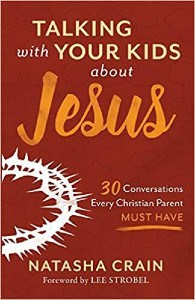Natasha Crain: A lot of parents do feel like, man, I haven’t talked about any of this kind of stuff with my kids.
Jim Daly: Right.
Natasha: I think the most important thing is actually just a shift in mentality, so that you have to be honest with yourself as a parent and say that the number one most important objective for my parenting is to raise kids that know and love the Lord. That’s the number one thing. Because if that’s not your priority, you’re not gonna have these conversations.
Jim: Yeah.
Natasha: So, it has to start with identifying that. And then the next thing is to get yourself equipped. Get yourself equipped with an understanding of today’s challenges. It’s not just the Sunday school basics anymore.
John Fuller: Natasha Crain joins us today on Focus on the Family. Your host is Focus President and author, Jim Daly. And I’m John Fuller.
Jim: You know, John, as a parent, one of the most important things you can do is help your child have a solid foundation of faith. I mean, that is job one. And you want their relationship with the Lord to flourish and stand the test of time, and culture, and outside influences, so that when questions and doubts arise, uh, they’ll stand firm in their beliefs.
John: Mm-hmm.
Jim: That’s what building a foundation is all about. You know, here at Focus on the Family, we want you to be equipped, and to know how to develop that kind of faith in your child. And, uh, this is essential stuff, I put it on the first shelf of the bookshelf, right?
John: Mm-hmm.
Jim: So, you’re gonna want to stick around as we talk with our guest today, Natasha Crain, who helps us to take a deep dive into faith conversations with our children.
John: Yeah. And Natasha has been here before. She is the mom of three and a speaker, blogger, and author. She’s written a number of books, and the one we’ll zero in on today is, Talking with Your Kids about Jesus: 30 Conversations Every Christian Parent Must Have. And of course, we have that here at the ministry. Just stop by focusonthefamily.com/broadcast.
Jim: Natasha, welcome back to Focus.
Natasha: Thank you so much, it’s great to be here.
Jim: It’s great to see you. Yeah, I mean, it’s so funny to think, uh, you know, you’re the expert in helping parents talk about Jesus with their kids. That’s a pretty big banner.
Natasha: Well, I don’t know, (laughing) it’s hard to call yourself an expert in anything, there’s always plenty that you don’t know, right.
Jim: No…I mean it’s…
Natasha: But I hope to help parents get equipped for these conversations.
Jim: It’s so good. And you know, you are a blogger and speaker, and you’re speaking to tens of thousands, hundreds of thousands of parents. What is one thing that they’re most concerned about? What do you hear back from them in this space that they really are troubled about?
Natasha: Well, I think that parents are increasingly realizing that the culture that we’re in today is getting tough. They see-
Jim: Boy, that’s true.
Natasha: Yeah. And they see it and they feel it. And I, I think it’s something that a lot of parents don’t know how to evaluate necessarily. They’re not sure how to actually pinpoint what the problems are. But they feel it, they see that their kid’s faith is going to be challenged, they’re just not sure exactly what that means for them. So, you see a lot of the fear, I think, in just wondering, how do I prepare my kids for today’s world? You know, I’m praying about it and I’m putting it in God’s hands, but what should I be doing as a parent, I think is the question that a lot of parents have feeling the weight of the culture around us.
Jim: Yeah. I would think too, it’s tough with parents because there’s so many demands on us to, you know, work either in the home or outside the home to keep everything moving forward. And so, we can get distracted, I think, on like I said earlier in the number one job we have, right, how do we pass our faith onto our kids? You compare faith in the book, which I thought was really funny, to house cleaning (laughing). How does house cleaning and faith development share a spot?
Natasha: Yeah, well, I was talking in the book, about how I personally struggle a lot with keeping a clean house. I think that a lot of parents probably understand what I mean by that.
Jim: People just leaned in on that one (laughing).
Natasha: Yeah, I think so. Absolutely. And I was on Facebook one day and I was just kind of scrolling through, and there was this article called Five Things That Tidy People Don’t Do. I thought, I better read this, this looks like one for me. So, I click over, and it actually had a really great insight. It said that tidy people don’t act like a slob all day and then suddenly try to clean up everything in one fell swoop. Instead, tidy people develop these small, non-drastic kinds of habits so that they’re just tidying a little bit all the time. And I thought, you know, this is a good insight for cleaning, but it’s also a really good insight for discipleship and faith conversations.
Because if we feel overwhelmed by just having these huge conversations at some point in our kids’ lives then we’re not going to do it. But if we see it more as a day-to-day kind of thing, that we’re always tidying up their understanding of their faith by having these little bits of conversations, it’s far less overwhelming.
Jim: Yeah, and it’s so good. That’s the whole, I think, the whole framework for your book, talking with your kids about Jesus. You provide 30 thoughtful ways to bring up discussions that are really pertinent to their faith development, right? And I think you relate that your daughter’s love of penguins (laughing) was able to be turned into a faith statement. How did you get there from her love of penguins?
Natasha: Well, her love of penguins, this was when she was a little bit younger, she went through a penguin phase, which every kid goes through a phase of some kind. So, she loves penguins on everything, on toys, and the stuffed animals, on her clothes, everything. And so, we were going to SeaWorld one summer about that time and I thought, “Oh, this is so great, she’s gonna get to see real penguins.” And I was excited to see her excitement. But when we got to the exhibit, I’m watching her anxiously to see what she’s going to do, and she looks totally uninterested. And so, I finally say, “Hey, what’s going on? Why aren’t you more excited about this?” And she said, “Well, you know, these are real penguins, I don’t like the real ones that much, I just like the cute toy version of them.”
Jim: (laughing).
John: Those don’t look cuddly
Jim: And they don’t smell bad actually.
Natasha: Yeah, they’re totally different, right? (laughing) So I use that in the book as an example of how to talk about the question of, “What is a Christian?” That question sounds like it would have a really obvious answer to a lot of parents. But the reality is that, today, about 65% of people in America say that they’re a Christian, so they self-identify as a Christian. But when researchers dig into what they actually believe and how those beliefs inform their lives, they find that only about 4% have a biblical worldview.
John: Mm-hmm.
Natasha: So, this is really interesting because you have a lot of people who say they’re Christian but they’re not believing the core truths taught in the Bible or living according to that. So, in other words, they kind of like this cute toy penguin version of Christianity that’s very different than the real thing. And sometimes that’s a conscious decision. They’re consciously rejecting sort of an Orthodox Christianity. But in a lot of cases, they don’t even realize that there’s a difference. They think that all the penguins are the same. And in reality, these are very different things.
So, in a culture that is redefining words and confusing words, and definitions, and meanings, it’s so important that we just start with this question of, “What does it really mean to be a Christian?” Because just because someone says they’re Christian, just because a church calls itself a Christian church, it doesn’t necessarily mean that they’re adhering to biblical truth.
Jim: Yeah, it’s so good. Starting that conversation, I mean, if you don’t have that penguin exchange, how would you recommend to parents that they can get into that discussion with their kids?
Natasha: Well, they have to go through a penguin craze first. (laughing) No, I’m just kidding.
Jim: Right, it’s a prerequisite.
John: You gotta love penguins.
Natasha: This is, this is the absolute easiest conversation to start with your kids, because you can just ask them, “Hey, if someone asked you, what is a Christian, what does it mean to be a Christian? How would you answer?” And chances are, 99 times out of 100, your child will say, “Well, it’s someone who loves Jesus, or someone who follows Jesus, or someone who accepts Jesus.” But that’s a great opportunity to kind of push them a little bit further and say, “But what does that mean to follow? What if someone says that they follow Jesus, but they don’t think that Jesus was actually the Son of God? Would they still be a Christian?”
And so, you can kind of push them on that because so many people today will define a Christian … obviously, in that gap between the 65% and the 4%, they’re defining Christian in all kinds of ways. So just introducing that concept to your kids of getting them to think about, “Well, what does it mean?” “How do you define that?” Let’s go back to the Bible and see what it actually says about being a Christian.
Jim: Yeah. I would think age and stage plays into this greatly, because, you know, our kids are kind of just phasing out of the teen years. And as you’re talking to a seven, eight, nine-year-old, it’s going to be very different talking to your 15, 16, 17-year-old. And in that idea of Jesus being a myth, maybe take us to that older conversation, because they’re in school, they come home one day and they say, “You know, I’m not, I’m not sure if Jesus was an actual historical figure.” How do you address that as a parent? And that, that should be a big clue that you got to now get off the block, right? We got to start talking about this.
Natasha: Yeah, absolutely. And actually, I really encourage parents to be talking about these things before it ever becomes the question, right? We want to prepare our kids to understand those things. And this is one of those questions that most parents aren’t thinking about. When you think about raising your kids as Christians, you’re not thinking about, “How am I going to explain to my kids that Jesus isn’t just a myth?” They’re just not thinking in that way, but yet, this is a very common claim today, especially on the internet.
John: Hmm.
Natasha: Uh, we call these people Jesus mythicists. They believe that Jesus never even existed as a person in history. And so, you’ll see all kinds of writings online about this. And they actually seem to be, at first glance, if you haven’t been educated in any of this historical sources, they seem to be sort of credible the way that this is presented.
Jim: Mm-hmm.
Natasha: And so, when we’re talking to our kids about that, the first thing is to say, “Okay, well, if you were going to figure out whether or not Jesus was actually a person in history, what are some of the things that you would look for?” And this can work with little kids or older kids, like you’re saying. And that can introduce them to a conversation about the nature of historical sources.
John: Mmm.
Natasha: And so, what we actually find when we look back at the historical sources is that we have three different types of references to Jesus that were early. We’re not talking about 800 years after Jesus when lots of stuff could have been made up, we’re talking about three different types of sources that were within the first 100 years of Jesus’s life. And so, we have the references from Paul,
Jim: Mm-hmm.
Natasha: …in Paul’s letters. We have references in the gospels obviously to Jesus. And then we have references to Jesus in non-Christian sources.
And a lot of people today, skeptics will say, and probably your teenage child will say, “Yeah, but that doesn’t count, the stuff that’s in the Bible, and Paul’s letters, and the gospels, why would that count? That’s bias, that’s the Bible.” But even if you don’t accept what’s taught in the Bible, even if you don’t think it’s true, even scholars who aren’t believers will acknowledge that those sources were written in response to the life of someone who actually existed, right? So, we’re just saying, at this point, we’re establishing that Jesus existed as a person in history. And so those are multiple sources just in the Bible of individual documents that point to the life of Jesus.
Jim: Yeah. And there’s great resources for developing that. I remember that was one of my quests in looking at writings of antiquity, how do you prove them true? There’s nothing more supported than the New Testament. I mean, ancient philosopher Socrates, Plato, they’re far less credible and we believe them. I mean, I believe those people existed, but there’s less external evidence for those figures than for Jesus, just by that measure of writings of antiquity. So, it’s good to get caught up on that as a parent and be able to do it. Your son loves science kits. I think you bought him a science kit that used some kind of illusion. And how did you translate that into the existence of Christ?
Natasha: Well, my son’s science kit, we … every year we were trying to find some kind of science kit for him. And almost always, these science kits that parents end up getting have some kind of little chemical reaction in it that makes a volcano in your driveway. So, we decided to get one that was about optical illusions this one year. And one of the things that really stood out to me from that year that we found in this optical illusions kit was this picture, and it had thousands of coffee beans on it, and somewhere in the picture there was this face that was hidden. We’ve all seen things like this, right?
Jim: Mm-hmm.
Natasha: And it was so funny to us because we couldn’t find it. Usually it takes, you know, a few seconds and you’re like, oh, there it is. We could not find the face; it took us a very long time. But once we had found the face, we could never look at the picture again without seeing the face.
Jim: Right.
Natasha: You can’t unsee it once you know it’s there, and you would always see the face in the coffee beans. So, in the same way, this really comes back to the question and that I use in the book was, “Is Jesus God?” Because a lot of times today, skeptics will say, “Why do you Christians even believe that Jesus is God? Because Jesus never claimed to be God himself. He never said the words, ‘I am God,’ so how … why do you think this?” And this is-
Jim: Well, for the purists, so he did say, “If you’ve seen me, you’ve seen the Father.”
Natasha: Yes (laughing).
Jim: Just, just on that one, I just want to make sure people know we do read the word (laughing).
Natasha: Yes, absolutely. But people a lot of times are looking for those literal words of saying like over and over, “I am God, I am God, I am God,” and we don’t see that. But there are all kinds of ways, like you’re saying, and all kinds of different forms that Jesus does in fact claim to be God in the Gospels.
And so, I use this, uh, acronym that a couple of scholars named Ed Komoszewski and Robert Bowman used in their book, and basically it just takes you through this acronym of HANDS, H-A-N-D-S. And it’s a great acronym for kids to remember to see all the different ways that Jesus claimed to share in the unique identity of God that go beyond just three words that skeptic so often look for.
And when you understand all these different ways of how Jesus claimed to be God, it’s like the face in the coffee beans, you can’t unsee it. Every time you read the Bible, from that point on, you see all the different ways that Jesus claimed to be God.
Jim: Mm-hmm.
Natasha: And just as an example, the “H” stands for honors, so Jesus shares in the honors due only to God because people were worshiping him…
Jim: Mm-hmm.
Natasha: … and He accepted that worship. Or “A” stands for attributes, that Jesus shares in the unique attributes of God, such as pre-existence, Jesus claims to have existed before the beginning of the world. This isn’t just a normal human claim, right?
Jim: Right.
Natasha: So, the acronym walks kids through these different ways that he claims to be God.
Jim: Well, hit the other since we’re here.
Natasha: Yeah, okay. Great. Well, “N” is for the names of God. So, Jesus actually claims certain titles for himself that only God claims, such as being the bridegroom, and in the Old Testament God is the bridegroom of Israel. And the D”” stands for deeds. So, Jesus did miraculous deeds, deeds that only God would do. And the “S” stands for the seat of God’s throne, which is that he would be sovereign over all things.
Jim: Mm-hmm That’s good.
John: This is Focus on the Family with Jim Daly, and our guest today is Natasha Crain. And, well, we are getting into some really deep stuff and some practical things you can do as a parent to cultivate a curiosity about God, and about the scriptures, and about Truth. And help them, as Jim said earlier, build a foundation. And it’s all captured really wonderfully, all of this, in the book that Natasha wrote, Talking with Your Kids about Jesus: 30 Conversations Every Christian Parent Must Have. And to get your copy, call 800, the letter A and the word FAMILY. Or stop by focusonthefamily.com/broadcast.
Jim: Uh, Natasha, I think if I were to ask Troy particularly, my son Troy, because he’s so well connected, Trent would be more scientific, you know, but, you know, what is evidence of knowing God? Uh, I think they both would, but Troy would really lean toward the fruit of the Spirit, because I would talk about that all the time. You know, uh, love, joy, peace, goodness, kindness, mercy, that if you have these things then the Spirit’s in you. And it’s one of the questions you raise in your book, or answer in your book, how do we help our kids learn what Jesus said about loving others? I mean, that’s kind of the core thing, right? Love your neighbor as yourself. So that’s such an important attribute to get across to your children. How did you do it?
Natasha: Yeah, well, love is another one of these big words that needs a definition today. Just like we talked about earlier with the word Christian. There’s a huge difference in what Christians mean by the word love or what they should mean by the word love, and what the secular culture around us means by the word love. So, this is another one of those places where we have to prepare our kids to understand how different we are in our meanings of the things that we say. And for Christians, it really comes back to, we want to love others based on God’s standards for love, whereas the secular culture wants to love others based on self-defined standards for love.
So as Christians we go back to the Bible, and Jesus was asked by a Pharisee, “Teacher, what is the greatest commandment of the law?” And Jesus says, “The greatest commandment is to love God, and the second commandment is to love others.” Well, that’s a really important sequence, that first comes loving God, and then comes loving others. Because in order to even know what it means to love other people, we have to first know what it means to love God.
Jim: Mm-hmm.
Natasha: So, for Christians, when we love people, we are loving them in the way that God would want us to love them, regardless of what they want for themselves. Whereas secular culture wants to love others based on what those others want for themselves. Those are two totally different things. So, when we talk about God’s love, we want to make sure that they understand not only what it means for God to love them through Jesus’s death on the cross and the things that we usually talk about in church, but also what it means to love others and how that has to be informed by a love for God first.
Jim: Yeah, which is so good. Uh, judgment in this culture, you know, can be a hot button topic. In fact, again, you turned an experience into an illustration, which I thought was really good, something about your daughter wearing mismatched clothes. How did that translate (laughing) into a lesson?
Natasha: Yeah, well, she came downstairs one day, and she was wearing this just horribly matched shirt and pants, and I just kind of looked at her and said, “You know, I think you should probably change, that doesn’t really go together.” And she kind of looked at me a little bit indignant and said, “Well, stop judging me.” And I, I kind of (laughing), I kind of did a double take because those aren’t words that we use in our house, so that’s not something that’s been like flying around in our home. But it was clear to me, from her comment, that she had already internalized this whole idea from her Christian school, and from her peers, and from what she’s hearing in culture around us, that, uh, that any kind of disagreement is … vocalized disagreement is judgment, and judgment is bad.
And that is ultimately what culture wants us to believe today. That if there’s any sin, if culture calls anything sin, they call judging others a sin, because judgment is supposed to be bad. Because again, just going back to our definition of love, if you’re loving people according to a secular definition, you’re affirming them in whatever it is that they want for themselves. So therefore, if you’re judging and you’re saying that maybe this isn’t the best thing, maybe this is objectively wrong, then culture sees that as very unloving and hostile.
And it’s interesting because this is something that both Christians and non-believers get wrong by looking at something that Jesus said. Matthew 7:1, Jesus says, “Do not judge or you too will be judged.” And people take that, and they cut it out with us razor like precision, and they say, see, you’re not supposed to judge. But we have to keep reading beyond that, because when Jesus says that it’s a prelude to this whole passage about not judging hypocritically. He says, “Take the log out of your own eyes so you can see clearly to help your neighbor to take…
Jim: Hmm…
Natasha: … the speck out of their eye.” He doesn’t say, take the log out and then you’re done, we want to see clearly to help someone else. And in another place he says, “Judge with right judgment.” So, we want to judge when by judging we mean discerning between what’s right and wrong. Absolutely, Christians are called to judge.
Jim: Well, and in that context, I think, our children, and we, are drenched in this idea of tolerance that, you know, if you suggest something to somebody to help improve their path, then that’s a judgment. And it’s amazing how we’ve turned tolerance into the religion of the day.
John: Mm-hmm.
Natasha: Absolutely.
Jim: (laughing) I mean, it’s … and that’s what you’re getting after. Uh, you and your children watched “The Sound of Music.” John, did you watch that?
John: Classic. We’ve seen it so many times.
Jim: Yeah. Yeah.
Natasha: (laughing).
Jim: It, it would appeal to Jean very deeply (laughing). I’d be thinking, how’d the Broncos do?
John: (laughing).
Jim: But you know, I want to be honest here.
John: So, you’ve seen it?
Jim: Yeah. Sound of Music, I have seen it.
John: Okay, just confirming.
Jim: I was much younger.
Natasha: (laughing).
Jim: But, uh, tell us about how you parlayed “The Sound of Music” into a spiritual lesson.
John: Yeah.
Natasha: Well, we, we have trouble as a family finding movies that we’ll all like, in part because we have different perspectives, like you wanting to watch the Broncos, I totally (laughing) understand that. So, we, at one point we decided, okay, “The Sound of Music” maybe that this one is gonna be something that would appeal to everyone. And I think my kids were maybe in fourth grade and second grade at the time. And so, we sat down to watch “The Sound of Music,” and as we’re starting to go through this movie, I’m finding myself hitting pause constantly because there’s so much background information that’s needed to explain to these young kids about World War II, and what are they running from, what’s going on here? And so, it was just very painful.
But a couple of weeks after that my younger daughter in second grade said, you know, she came home from school and she said, “Mom, we watched ‘The Sound of Music’ today at school.” (laughing) I said, “How on earth did you do that given how much context you have to get through with all these kids?” And she said, “Oh, well, everyone just kind of understood it in their own way, we didn’t have to have any kind of understanding from the teacher.”
Jim: Mm-hmm.
Natasha: And I just thought that was so interesting because today we hear so often that people want to understand the death of Jesus and what Jesus accomplished for us on the cross in their own way. And this isn’t so much from secular culture as a challenge, but this is a challenge within the Christian church, because a lot of progressive Christian churches in particular are teaching that Jesus’s death on the Cross had nothing to do with atoning for our sins and, and that Jesus died for us, they see that as a negative thing. In fact, one progressive children’s pastor I know of said it was traumatic for kids to think that Jesus had to die for them. So, this is something that progressive Christian churches are just taking out of theology completely and saying that Jesus was just a model of love, basically, and that he was-
Jim: In order not to traumatize.
Natasha: In order not to traumatize.
Jim: That’s amazing.
John: Mm-hmm.
Natasha: In order to not cause any kind of psychological damage to your kids. And so that led us to this conversation about, you know, it’s not just up to us determine meaning. You can pretend that you have come up with your own meaning for “The Sound of Music,” but that movie really is about something that’s actual and real, just as Jesus’s death on the cross is actually about Jesus’s purpose for coming. He said he came to give his life as a ransom for many. And so, He said what his purpose was. And then that gave me an opportunity to talk to my daughter about how the meaning of the cross is something very objective, is something that he actually did by dying for our sins so that we could have eternal life.
Jim: And again, I think part of it here, part of the skill set for the parent is speaking to the child at an age-appropriate way, right?
Natasha: Yes.
Jim: You certainly don’t want to traumatize a child, but so you, you go into it at different ages differently.
John: Mm-hmm.
Natasha: Absolutely. Yeah. And I think that, you know, kids are definitely sensitive to death sometimes when they’re younger.
Jim: Yeah.
Natasha: And so, you can go into that with that kind of sensitivity. But at the same time, when they understand that, that wasn’t the end of the story, I think that is the key to helping kids, especially when they’re younger and sensitive to this, understand that this was victory because after Jesus’s death he came back to life, and because of that we have the hope for eternal life with Jesus.
John: Mm-hmm.
Natasha: And that’s the ultimate display of God’s love for us.
Jim: And it’s kind of the core understanding that they need to catch is why, why Jesus had to die for us.
Natasha: Absolutely, why it matters.
Jim: And the importance of it. You know, Natasha, um, I’m thinking of the mom and dad who feel like they haven’t done a very good job of having these kinds of faith conversations, taking this all the way back to your, you know, uh, tidying of the home analogy that you do a little bit every day and things will go well. How do we recalibrate then if we haven’t really done that micro-tidying, we haven’t had these small discussions, so that we’re drip irrigating our faith into our children. What can a mom and dad do of a 13–14-year-old who there just hasn’t been that much time or we haven’t taken that much time to talk about these important concepts? What can they do today?
Natasha: Yeah, I think that’s a hugely important question because a lot of parents do feel like, man, I haven’t talked about any of this kind of stuff with my kids. I think the most important thing is actually just a shift in mentality, so that you have to be honest with yourself as a parent and say that the number one most important objective for my parenting is to raise kids that know and love the Lord. That’s the number one thing. Because if that’s not your priority, you’re not gonna have these conversations.
Jim: Yeah.
Natasha: So, it has to start with identifying that. And then the next thing is to get yourself equipped. Get yourself equipped with an understanding of today’s challenges. It’s not just the Sunday School basics anymore. It’s not just Jesus loves me and now I’m gonna be happy the rest of my life, that’s not what it is. There’s so much more to our Christian faith. A lot of times it’s not talked about in church, so we have to take that responsibility as parents, remember, we are the primary disciplers of our kids, and get equipped to understand, what’s going on in culture? What do I need to talk about with my kids? Like the questions that we’ve talked about today. And once you start to have that understanding, then you start to have the radar up, the worldview radar, that allows you to go through and each day see these opportunities like the coffee face in the beans, and things like that, that before you wouldn’t have thought of. But when you’re equipped, you start to see those opportunities every day.
Jim: And I’d add too or ask you, uh, is there an age limit? I mean, again, I have 19- and 21-year-olds. I think some of these discussions still apply there. It’s more adult like, you’re not gonna talk in, you know, childlike ways. But the concepts are still true to have those conversations with your 20 somethings.
Natasha: Absolutely. Parents should never give up. I wouldn’t want any parent listening to this to think, oh, my kid’s 20, you know, that ship has sailed, because you can still have the conversation with your adult kids. And I know a lot of parents who have actually contacted me and talked about how this kind of content has helped them to have conversations that they didn’t otherwise know how to relate to their kids about but now they’re having it on a deeper level with them.
Jim: Yeah.
John: Mm-hmm.
Jim: Natasha, this has been so insightful and, you know, beyond just helping children develop their faith in Christ and deepen it, it’s sure to help many parents do the same thing as they contemplate these questions and then study up to be able to have that discussion with their children. This has been terrific. Thanks for being with us today.
Natasha: Yeah, thanks so much for having me.
Jim: Yeah.
Natasha: It’s been great.
Jim: Let me turn to the listener. I mean, this is exactly the kind of resource that Focus wants to provide you as a parent. So, get in touch with us. We love doing ministry together. It has to work that way.
So, if you can make a gift on a monthly basis, that’s terrific, and we’ll send you a copy of Natasha’s book as our way of saying thank you for joining us in ministry. If you can only make a one-time gift, that’s good too. We count it as help, and we’ll send the book to you to say thank you as well. So, either way, we’re doing ministry together and you’re getting a great resource to help you in your parenting journey.
John: And as Natasha has been talking about today, this is a journey of 1,000 little steps and 1,000 interactions with your child in everyday circumstances. Focus on the Family has something to help you in that on a day-to-day basis, it’s called the Live It Challenge, and we’ve got details on the website about that.
Donate, learn more about the Live It Challenge, and get a copy of Natasha’s book, Talking With Your Kids about Jesus. Our phone number is 800, the letter A, and the word FAMILY, or stop by focusonthefamily.com/broadcast.
Join us again tomorrow. Pastor Ted Cunningham explains what it really means to understand we’re created in the image of God and how to affirm that in others.
Preview:
Pastor Ted Cunningham: Honor recognizes value, it does not set value. When I honor you, I am calling out the value in your life, I’m not determining it. You know what that means? There’s nothing I can say or do that adds to or takes away from your value, nothing.
End of Preview























